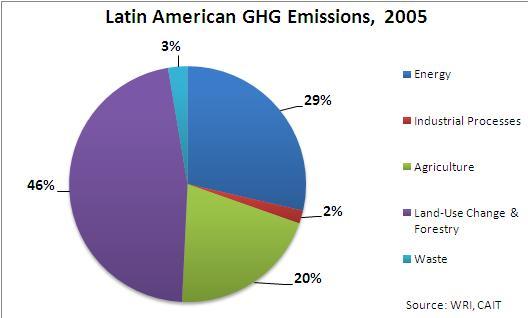President Obama will be travelling through Latin America March 19-23, 2011 with stops in Brazil, Chile, and El Salvador. This is a region that has countries that are: major emitters, key players in global warming negotiations, taking action and ripe for further action, and on the front lines of the impacts of global warming. As he meets with leaders in South and Central America he has an important opportunity to advance action on global warming.
 The Latin American region is an important source of carbon pollution accounting for around 12% of the world’s global warming pollution.* The majority of these emissions arise from the loss of tropical forests. But the region is also home to some large suppliers of oil and other activities which are significant sources of global warming pollution (see figure).
The Latin American region is an important source of carbon pollution accounting for around 12% of the world’s global warming pollution.* The majority of these emissions arise from the loss of tropical forests. But the region is also home to some large suppliers of oil and other activities which are significant sources of global warming pollution (see figure).
In each country he can accomplish important actions that will help address global warming.
Brazil. The first stop on President Obama’s trip – Brazil (March 19-20) – is a central player in global efforts to address carbon pollution. Brazil is estimated to be the 4th largest source of carbon pollution, after China, the US, and the European Union.* Brazil’s emissions are primarily from deforestation in the Brazilian Amazon, which loses an area the size of 1.2 million football fields every year. Recently, Brazil has shown very important progress in tackling its deforestation as its rate has declined by 67% in the past 5 years. So they are an important country where action must occur.
While in Brazil President Obama should:
(1) Agree to help Brazil use Rio+20 as an opportunity to advance concrete action on global warming. In June 2012, Brazil will be hosting world’s leaders in Rio de Janeiro, Brazil for the the Rio+20 Earth Summit. This Summit is an important opportunity to advance concrete action on global warming. So President Obama’s trip comes at an important time to discuss with Brazilian President Rousseff how the US might assist with ensuring that this Summit helps make tangible progress. It looks like this might be on the agenda as Michael Froman (Deputy National Security Advisor) stated in a preview of the President’s trip:
(2) Highlight the importance of tackling tropical deforestation. The U.S. has a long history of helping countries in the Amazon tackle the loss of their tropical forests. The US has recently committed to making important investments in helping developing countries addres their deforestation. So this trip provides an important platform for the President to reaffirm his commitment to ensuring that his Administration will fight for continuted US investments in deforestation reductions (currently under attack by the House Republicans). And he can help to highlight to other countries the progress that Brazil has been making through strong support for targeted efforts.
(3) Create opportunities for American companies to sell clean energy into the Brazilian market. Brazil is a major player in biofuels and has seen its wind market grow by 54% between 2009 and 2010. American companies are already tapping into this growing Brazilian demand for wind. The President has an opportunity to further advance efforts to deploy clean energy in Brazil, an effort which would be greatly expanded if the US Congress passed a budget which made critical investments in efforts that help American companies tap into the growing global demand for clean energy.
Chile. On his second stop in Chile (March 21), President Obama is visiting an important economic power in Latin America. Chile has become a much more active player in international efforts to address climate change as a part of the Cartegena Dialogue and has begun to make commitments to move towards a lower carbon future. But right now it is facing an energy choice – will it invest in energy efficiency, wind, geothermal and solar, or destroy beautiful places with its energy choices?
While in Chile President Obama should:
(1) Support Chilean efforts on clean energy deployment. As my colleague discussed, Presidents Obama and Piñera should endorse targeted efforts together on energy efficiency and non-conventional renewable energy. This should include Chile creating a national energy policy, putting efficiency back on the agenda, securing long-term markets for non-conventional renewable energy projects, moving away from continued reliance on more poorly-planned large hydro and dirty coal plants, and considering the full environmental impacts of major energy proposals.
(2) Not pursue nuclear energy support with Chile. U.S. President Obama and Chilean President Piñera are continuing with their plans to sign a nuclear accord ahead of Obama’s visit to Chile next week. This is the wrong course to pursue, especially since Chile has abundant options that are safer, more economical and more sustainable.
El Salvador. At the President’s last stop of his Latin America trip – in El Salvador (March 22-23) – President Obama is visiting a country that is right now facing the impacts of global warming.
While in El Salvador President Obama should:
(1) Highlight the damaging impacts that global warming is having right now. As one of the many faces showing how global warming is impacting people as we speak, President Obama could use his visit to El Salvador as a platform to remind everyone why we must address carbon pollution and help the most vulnerable adapt to the impacts of global warming.
(2) Remind Central America of the opportunities of
investing in energy efficiency and renewable energy. The US launhed an effort called Energy and Climate Partnership of the Americas which could serve as a key opportunity to help deploy clean energy in the region.
President Obama could leave his trip through Latin America with tangible progress on actions to address global warming. There are some real actions in Brazil, Chile, and El Salvador that could help. I hope he takes advantage of this opportunity.
———————————-
* Based upon data compiled by the World Resources Institute in the Climate Analysis Indicator Tool. The most recent country-by-country data which includes emissions associated with deforestation is for 2005.



